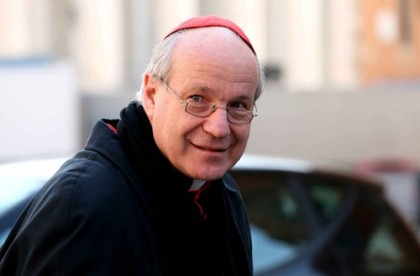Cardinal Schönborn, my teacher: Lesson 1
Katie van Schaijik | Nov 12, 2015
Reading an unsettling headline about Cardinal Schönborn not long ago, I paused and reminded myself of the remarkable impact he's had on my understanding over the years. It's not normal. I don't know him personally; I haven't followed him closely or read his books and scholarly articles. I've met him and heard him speak only a few times, and yet, I can pinpoint at least four occasions when something he said brought about a seismic shift in my thinking and perspective.

Each is substantial enough to merit a separate post.
The first time I met him was in 1991—even before he was named Archbishop of Vienna— when he visited Franciscan University's newly-established Austrian campus. Jules and I were on the staff there at the time. He must have said mass, but I don't remember that. What I remember is the dinner afterwards, with maybe 20 of us at table. The first impression was of his exceptional personal dignity and graciousness. To encounter him is to perceive immediately the attractive power of aristocratic refinement married to Christian faith and virtue. The gentleness of his voice alone communicates grace.
He spoke of his work on the Catechism of the Catholic Church, then in development. Afterwards we were invited to ask questions. A history professor who had been born and raised in pre-conciliar Catholic culture made a humorous and sarcastic remark about the Jesuits and their role at the forefront of post-conciliar heterodoxy.
At the time, I was with the professor in thinking about the Church in rather black and white terms. There were good guys and bad guys. The good guys were those defending orthodoxy; the bad guys were those who weren't defending orthodoxy. The Jesuits (on the whole) were definitely among the bad guys.
Cardinal Schönborn's response took me aback. First, he took the comment seriously. Then he spoke with sympathy and admiration of the extremely challenging mission the Jesuits had of being on the "frontier" of developing theological truth.
It was a completely new thought to me—the idea that the Jesuits might have a mission like that in the modern world, and that it's a difficult one, calling for respect. To simply defend orthodoxy is comparatively easy. To open yourself to all that's valid in modern experience without losing your footing in Tradition is, literally, a super-human task. We shouldn't be surprised or scandalized to find that mistakes get made along the way.
Then he spoke with equal sympathy and respect toward those (like the professor and me) who were alarmed by the turn the Jesuits (and many others with them) had taken. "There was a real moment of fright." In the decade or two following Vatican II, it looked at times as if the Church really was veering into disastrous error.
In just a few lines, spoken off the cuff, he had exposed to me my own small-mindedness and lack of faith. He had given me a vision of the workings of Providence in human history and through human struggle that was far grander and more beautiful than anything I had till then conceived.
He taught me to be at the same time larger-minded and humbler in my evaluations of the world and the Church—less peremptory, more generous in my judgments and interpretations of others—and more confident that God is on His throne in heaven and all shall be well.
